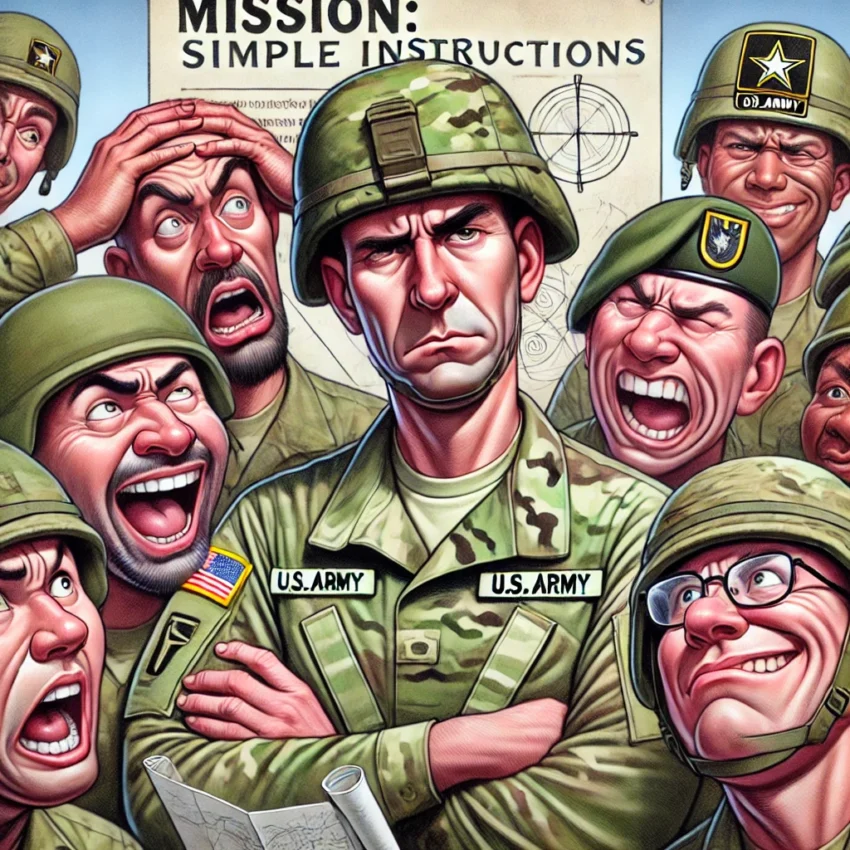MISSION REPORT: FORT FUBAR
(CLASSIFICATION: FOR YOUR EYES ONLY)
SITREP: Why your subordinates suck at taking the initiative and how you can help them
There are 10 minutes left in the second quarter of a tied basketball game in the NBA finals. Lebron James steals the basketball and begins his fast break, but instead of taking the ball all the way down the court, he pulls up from half court and shoots. Swish, nothing but net. The next play, the point guard dribbles the ball down the court only to be stolen again by Lebron, but this time he takes it all the way to the hoop on a fast break. As he shoots the layup, with no one around, he misses!
My question to you is, which is the better shot? He hit the half-court shot but missed the layup. Making the assumption that the half court shot was a better decision than the layup based on the outcome is called “resulting.” This term was made famous by a book from a professional poker player named Annie Duke, in her book called “Thinking in Bets.” Basically, we often think that a decision was either good or bad based on the results (or outcome) that the decision produced. But this hot garbage! Of course, the better decision was to shoot the uncontested layup! Why? Because of probability, durrr.
The best decisions are the ones with the highest probability of success. Yeah, you could buy a lottery ticket every month and hope to win it big. Or you could invest that same money in a low-cost S&P 500 index fund practically guaranteeing your self success over the long run. But what if you won the lottery!? It still doesn’t change the fact that it was a bad decision based on the probability of the outcome. Sooooo, the bottom line is, make the decision or do the thing that has the highest probability of success.
Now for some of you less intuitive individuals, you may be thinking “what does this have to do with subordinates taking the initiative?” All the freaking time, I’m asking my NCOs and officers to “take the initiative,” and there like “but I don’t know what to do.” Well, listen up buttercups, this is how it’s done. You take all the available information that you have right at that moment. You then ask, “what needs to be done to make us successful?” Once you recognize what needs to be done (or the decision that needs to be made), you come up with the “3D Plan.” The first D stands for the “Dream Plan.” This is what will happen if everything goes right. The second D stands for the “Down to Earth Plan.” This is what will most likely happen. The final D stands for the “Doo Doo plan” (doo doo is slang for poop). This is what happens if the plan goes wrong.
Once you know the 3Ds, you will assess the probability (or likelihood) that your decision will fall into each of those 3 different categories. For example, what is the likelihood your decision will result in the Dream Plan coming to fruition, what is the likelihood that your decision will result in the Down to Earth Plan coming true, and what is the likelihood that your decision will bring about the Doo Doo Plan scenario. If the Doo Doo plan scenario is very unlikely or even not that bad of a scenario, then EXECUTE THE DECISION!
But just like with anything in life, it takes practice to be good. Your subordinates need repetitions making decisions and taking the initiative. If you spoon feed them (aka detail command), create an atmosphere of “no fail” where they are terrified to make a wrong decision, or never give them the autonomy to create and take the initiative, then you yourself are creating non-initiative taking zombies.
The best part of making decisions based on probability is that it allows for the subordinate to clearly explain their thought rational. They can say things like “Sir, based on the available information we had of X, we decided to do Y because it had the highest probability of success.” That way if it does fail, you at least know how they arrived at the decisions they went with. It allows you to determine if the result was bad because of faulty logic, or if you the decision just failed because of a statistical anomaly. It also allows you to identify possible flaws (if any) in their reasoning which can be addressed and used to make on the spot corrections for next time they have a decision to make.
The end result should be a bunch of little yous running around, making excellent informed decisions based on probability, getting things done that are implied tasks without you having to specify them. It’s as if you have cloned yourself and maximized your efficiency. Talk about a combat multiplier!
So that’s it. Make decisions based on probabilities and not results, and the results will follow. It’s just math. Shooting uncontested layups will almost always result in more made shots than shooting from half court, over a greater sample size.
“What we think or what we know or what we believe is, in the end, of little consequence, The only consequence is what we do.” – John Ruskin
Love this article? Great! Let me know and I’ll produce more. Hate this article? Well, it’s probably ‘cause you suck at decision making. Why don’t you go ahead, respond, and let me know why I am wrong.
*This article was written by FUBAR 6. All opinions expressed in this article are that of the author. This article is not endorsed by the Department of Defense, the United States Army, or any other state or government agency. Comments to the author can be submitted below.

